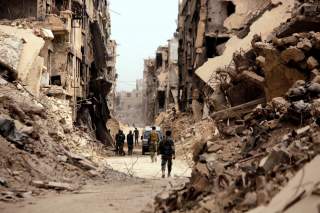America Must Find New Ways to Protect Syrian Civilians
Syria's own government and the United Nations have failed. It is up to Washington now.
Second, the United States maintains a military positioning alongside Syrian opposition groups at a joint base in Al-Tanf in southeast Syria, just a few kilometers north of the informal Al-Rukban IDP camp on Jordan’s border. While the United States does not provide security for the IDP camp, it has utilized partnerships with other militias to ensure the camp’s security and the civilians who reside there. Rukban remains a sensitive topic for the Jordanians who perceive the camp as a security threat following a wave of attacks, the worst of which left Jordanian security forces dead in 2016.
With an estimated fifty thousand Syrians, responsibility for the Rukban camp has induced a conundrum in which providing for and protecting the IDPs stranded there falls simultaneously on Jordan, the UN (when allowed access), the Syrian opposition units in the area, and the United States, indirectly. But, Russian-Jordanian negotiations for the relocation of Syrians are reportedly underway, without arriving at any publicly announced agreement. While the United States is not taking direct responsibility for the protection of Rukban, it should play a critical role in providing both safe passage to, and safe options for, voluntary settlement outside of Syrian-government-held territory for those who fear government retribution.
The absence of broader civilian protection in Syria presents a serious concern for the safety and security of the country’s post-war identity. The Caesar Act reaffirms a U.S. commitment to PoC in Syria on paper, but should not be utilized as a justification for a broader intervention into Syria. While prospective peace and PoC measures may be underway, no other international stakeholders are promoting the protection of civilians as a goal-in-itself. The United States should lead the charge on this front, helping to foster a safe and inclusive Syria by assisting directly in areas in which it maintains influence and collaborating with other stakeholders in regions where it does not.
Jesse Marks is a Fulbright fellow in Amman, currently at the University of Cambridge.
Logan Pauley is a Herbert Scoville Jr. Peace Fellow with the East Asia program at the Stimson Center, a non-partisan think tank in Washington DC.
Image: Reuters

